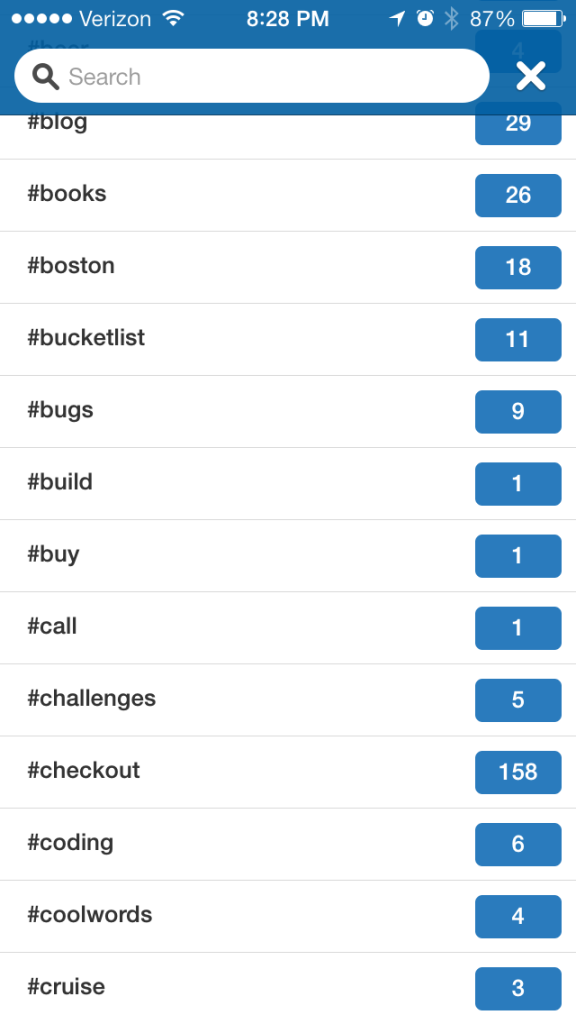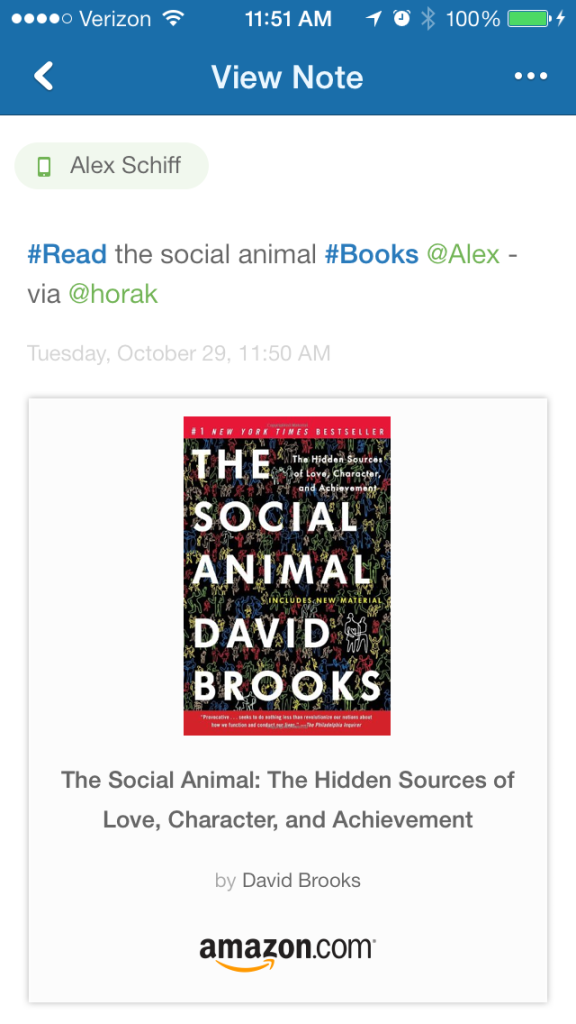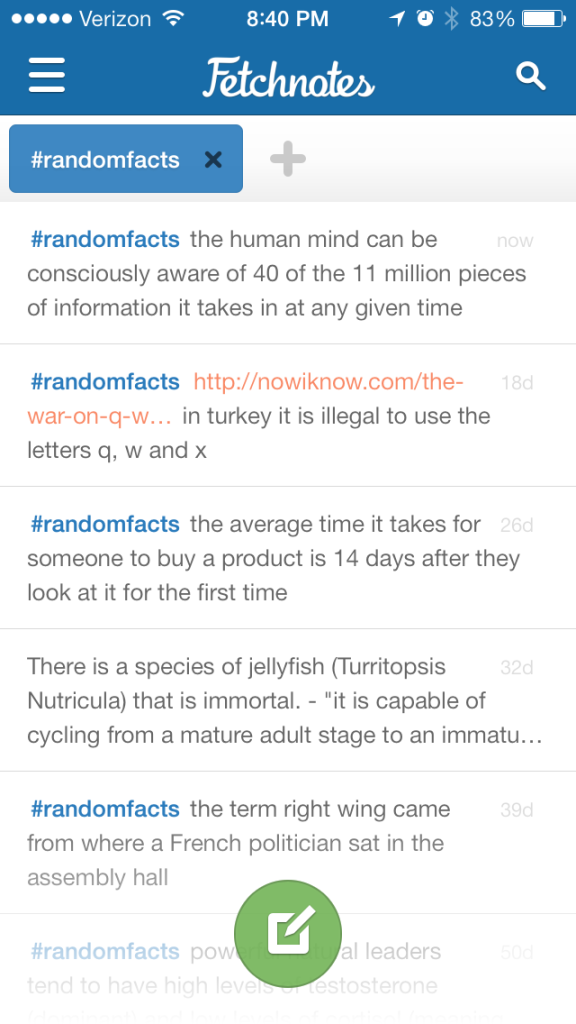Turning Thoughts into Productivity | The Fetchnotes Story
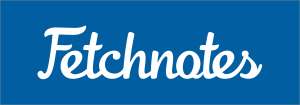 We’ve been there. Turn on your phone and look at the productivity folder. Three, maybe four apps; each with their own learning curve and rules of engagement. Something to write your notes, another to set reminders, and one that does both. But you know, with a social aspect and extra cute buttons.
We’ve been there. Turn on your phone and look at the productivity folder. Three, maybe four apps; each with their own learning curve and rules of engagement. Something to write your notes, another to set reminders, and one that does both. But you know, with a social aspect and extra cute buttons.
We’ve all been there. For most of us it’s a golden sand pit. Why? Because we’ll probably default to the organized chaos of the native iOS/Android notepad anyway. The notepad, a digital labyrinth of half thoughts and strings of metadata requiring the memory of a carrier pigeon to navigate. Kind of like a disarrayed choose your own adventure book about your life.
Okay I’m exaggerating, but if you’re still with me, I feel your pain; of not knowing what keyword to search your inbox for to find your favorite cat video. But luckily, there’s others who feel your pain and they’re trying to solve it. Introducing Fetchnotes.
Their claim? You’ll be more productive within three weeks time.
For the unfamiliar, Fetchnotes has devised a beautifully efficient method in note organization. No folders, submenus, or “category-container-box-lists”. Write your reminder with a string of hashtags:
#todo #pick up autobiography of arnold schwarzenegger from #amazon
or
#reminder #get chicken, pickles, and #jackdaniels for weekend potluck
You get the idea. And for the 81,000 avid users, we’ve got some exciting news. Updates and the Fetchnotes backstory, expressed through a narrative interview with Fetchnotes CEO, Alex Schiff. We discuss productivity, emails, communication, and the dynamics of the team.
My take? If you’re one of the “tried everything” to get organized kind of people (like me), it’s definitely worth taking a look!
Alex and I begin our interview discussing organization as a whole and the vast quantity of seemingly ineffectual productivity apps at our disposal. As Alex points out in this blog post there’s a ton of options out there in a severely fragmented industry. As in, not one company (even the largest, Any.do) holds over 1% market share in the mobile to do list space. Many options and large scale turnovers by users. What’s going on here?
Alex’s thoughts:
“If you look at the space, there’s a lot of companies that make productivity and task lists, but they don’t work. We think it’s because they’re all assuming that people actually have time for task management in the first place.”
Huh? But isn’t that why we task manage in the first place? He goes on to explain that these companies assume their average user will have the time about organizing their notes. They often require you to learn a system and organize your life meticulously.
“Problem is, people are lazy. We have bad habits and we often don’t do things that are in our best interest for the long term. It doesn’t make us bad people. We’re just busy. Really, really busy.”
And from this assumption is how Fetchnotes built their product; by taking the basic idea that people are just looking for easy ways to capture their thoughts. Simple. Through this, Fetchnotes has created something for the mainstream users, not the hardcore task managers.
Instead of the compose -> label -> prioritize model which can take up precious cognitive resources, they’ve switched to a “getting things done” perspective and leveraged existing behavior to create simple tools.
ENTER THE #HASHTAG
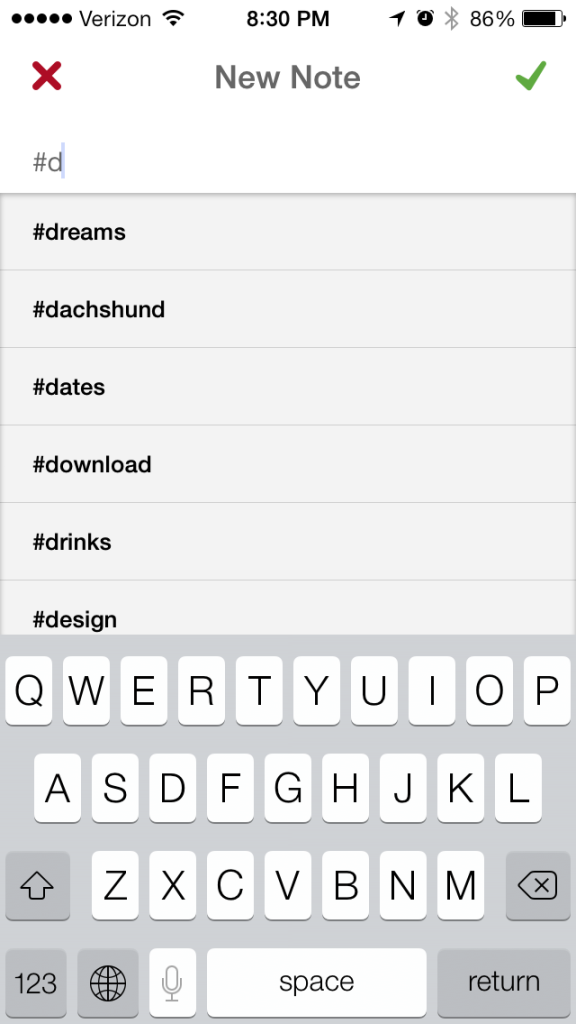 Alex explains why the Fetchnotes’ #hashtag system works.
Alex explains why the Fetchnotes’ #hashtag system works.
“It’s a behavior that exists in our everyday online interactions anyway. By organizing things this way, you’re writing your note and organizing it at the same time. Less time and moving parts needed.”
And there it is. Simplistic in concept; straight forward in application. You have an idea that pops into your head. You’re not necessarily sure if it’s going to be something that needs followup in the short or long term. It’s important, that’s all there is to it, and it needs to be recorded.
Write down your #idea and #hashtag as you go along. Maybe it’s a #bucketlist item or a #reminder to yourself.
It’s one of those “why didn’t I think of that?” light bulb moments. Which is why my next question to Alex was: Where did this idea come from?
FETCHNOTES WAS CONCEIVED IN A CLASSROOM
“I was taking a class at Michigan about lean startups; it was a great class and one of my first thoughts was to create an ideas marketplace. At the time I was using an already aging Blackberry to save my notes. The notepad was my idea bank. I’d open the notepad up, scroll all the way to the bottom, and write new ideas. It an extremely clunky process but it worked for the time being.
And of course, one day, the Blackberry dies and erases everything. I’d been looking to get a new phone anyway, so it was like it knew and decided to punish me.”
And from there did Alex form the “must have” list for what would eventually become Fetchnotes. The prerequisites:
- A cloud-based app for security from data wipes
- Must be something easy to use for non-task managers (he claims to be a very unorganized person)
- Must avoid the dreaded notepad sand pit: 1 note with a billion things, a billion notes with 1 thing
Through getting feedback from his classmate, he realized people were having the same problems with overcomplicated productivity apps that forced highly structured systems on the user. These ideas became concept and grew into a school project.
Alex explains the good timing of everything as he was noticing the prevalence of #hashtags being used organically on Facebook. For him and his founding team, this was just what they needed; a system to organize as you’re writing your note: intuitive usage (since most of us had been tweeting for a while now) with the ability to cut down on organization time.
The team originally did A/B testing with #hashtags versus /slashtags with one to denote higher categories. Fetchnotes no longer uses the /slashtag in its present form. And that, became the core of their product.
“No extra steps, a quick ability to pull up notes, and all the information you need contained within the note itself.”
81,000 USERS & COUNTING
So for Fetchnotes’ 81,000 user base, they already agree with this simplicity. And luckily for them, the FN team is rolling out a new iteration with some great tweaks. Enter, social.
Alex talks about version one and the problems they had: Not as intuitive as it could have been, kind of buggy, no notifications, but now, all of that fixed. The key difference with this new roll out? The ability to share with friends outside of this 81,000 user base.
The cool part of this most recent idea; with their newest update, you’ll now get to send notes and tag friends outside the Fetchnotes user base. Alex explains a subtle but key distinction in other user-user based sharing apps with the idea that apps tend to keep a strict fence to separate the users and non-users. Non-users will get snippets, fragments, or a plain sales pitch:
“Your friend sent you a _______, download our app to see the full message!”
The Fetchnotes team’s thoughts on this? Plainly, it sucks. It creates an inherent demarcation between user and non-user and makes everyone feel terrible for using/not using the app. So with Fetchnotes’ latest updates (live as of Wednesday, November 13, 2013), you can now share your notes to anyone in your unified address book through SMS (it was the simplest system). So even Fetchnotes non-users will get as much information possible (with SMS limitations).
“We believe in one thing, to facilitate reminders and communication, and we wanted it to not be app specific. People are sharing content with each other because they think it’s valuable. They don’t want to feel bad about spamming their friend or annoyed at getting a new app invite. We need to make it about the people, not the product.“
Some interesting findings from their user base:
- The critical point of retaining users was 3 weeks. Beyond the 3 week “testing period”, the bounce rate was much lower.
- 50% of their users who made it past 3 weeks were sharing notes with each other. 5% were not sharing. A drastic difference.
- Notes become instantly more “important” when there’s someone else to rely on (hey can you take care of this for me?)
PERMANENT vs NON-PERMANENT COMMUNICATION
Probably one of my favorite parts of my conversation with Alex. Some homework for you all after reading this, give his blog post on communication trends a whirl. Cliff notes: Communication can be roughly broken down into two forms:
- Permanent (Note taking) – An ongoing bit of information that would require follow up and action across a longer timeline.
- Impermanent (Task list) – Quick turnover items that require a basic read and reply. They’re usually turned over quickly and shouldn’t stack up to be more than 10-20 at a time.
This takes our discussion all the way back to the searching through your inbox for the cat video joke I made at the beginning of this article. A very real phenomenon and what the Fetchnotes team is trying to fix is this idea of the “Inbox task list”. Emails are inherently a permanent medium of communication, so it becomes extremely messy once we start doubling it up as a task list. Your long term reminders get mixed with the quick turnover tasks, and as you build up the list, nothing gets done.
Alex goes on to explain the beauty of Fetchnotes. He discusses how many of their users come from other products and comment on the flexibility of archiving #latent #longterm items to balance out the #todo #tasks that need to be handled immediately. Either way, I highly encourage everyone to give Alex’s piece on communication a whirl.
WHERE’S COMMUNICATION GOING?
Alex identifies two big trends:
- No concept of waiting – communication will be in real time and require immediate feedback
- Fundamentally different concept of privacy
Along with an interesting personal anecdote to explain these ideas:
“We’re in the age of the ephemeral message. We text, email, share, and post these quick to consume pieces of media. This idea of the abstract black box where all your messages go and await response, it just doesn’t happen anymore. That, and a fundamentally different standard for privacy.
Something interesting I had seen with my younger cousins who grew up in the midst of social media (versus the rest of us who saw it develop). They talk to each other through Twitter. “Hey, where are you, what’s going on tonight.” Literally having full blown conversations on Twitter. Privacy? No big deal, it’s not sensitive material, and if I have to go private, I’ll just text anyway. Which of course, is a much more ephemeral mode of communication than email. With email, you send one, and you just assume there needs to be a delay in getting a response. They just don’t want to deal with that.”
So does this mean email is on its way out?
“Yes and no. Email is definitely here and I see it being more important for long form content; but I think the change will be in how we perceive time. The tools will be fundamentally different and there’s going to be a strong push towards temporary communication.
If anything, the hundreds of (hey check this out and hey, can you do this) emails will be replaced by these immediate forms of communication and tools. And the younger generation that doesn’t really use email in the first place? They’ll most likely need to pick it up in the work place, but I actually don’t believe that trend will continue in the long term.”
THE HEART OF FETCHNOTES
Fetchnotes is run by a group of six entrepreneurs, four who graduated from the TechStars incubator. The original four all left the University of Michigan early (Alex included) and added two people since they graduated. Most of them were in classes together, but not a single one of them has a college degree.
Interestingly enough, the final member of the core six was a user who reached out to them to meet up, and just when Alex and the team thought they were going to get a little bit of feedback, they were blindsided (in a good way) by a full blown set of specs and mockups.
#Personal #note. I really appreciate founder’s stories like these. Thanks for your time Alex!
And with that, the company announces their recent release of Fetchnotes Version 3, available from the iTunes store. Android and web app updates will be available soon.
To learn more, be sure to check out their Youtube channel and give Alex Schiff’s articles on the productivity industry and the future of communication a read through.
OFFICIAL PRESS RELEASE BELOW
Wednesday, November 13, 2013 at 10:00AM EST
Techstars company aims to make productivity as simple as writing a tweet
Cambridge, MA – Fetchnotes, Inc. launched the newest version of its iPhone productivity app today, with an emphasis on organizing communication between families, friends and small teams. Primarily for personal use until now, this release unveils a significant evolution in both features and positioning. The company graduated from the TechStars Boston program last fall, and it has helped people over 80,000 people take nearly 1,000,000 notes to date.
“The problem with the tools we use for staying organized with others is that they’re not the same tools we use by ourselves — they’re out of our default workflow,” said Alex Schiff, Fetchnotes’s co-founder and CEO. “Fetchnotes always starts with keeping track of what you need to do and what you want to remember, but this release finally bridges the gap to the people those things actually involve.’ Who you recommend music to, who you share shopping lists with, who you delegate tasks to, and so on.”
Fetchnotes allows people to organize and share their notes with the same conventions popular on social networks like Facebook and Twitter — hashtags organize and @mentions send them to other people. Since you choose the tags as you type, everyone’s experience is personalized to the way their brain naturally organizes information. Unlike texting or email, you can also organize communication to others before they even see it.
“I can literally add something to my husband Chuck’s to do list, by mentioning his name in a note and adding ‘#todo,'” said Lucy McQuilken, a Board Director for Fetchnotes. “And Fetchnotes integrates with my address book, so I can send that to my daughter, who might not be using it yet, as a text message. All as I’m writing the note. The same thing for book recommendations, dim sum places in Boston — anything I want to remember.”
Some of the new features being launched:
- Push notifications when someone shares with you
- Address book integration to share with non-users
- Swipe to archive notes you don’t want in your main feed
- End to end redesign
Similar features will be coming to the web and Android versions of Fetchnotes in the coming months.
About Fetchnotes
Fetchnotes was launched by a group of students at the University of Michigan in 2012. After leaving school early, they moved to Boston for the TechStars program. The company is backed by Techstars Boston (Fall 2012), Beta Fund, Start Garden, the ex-COO of Harmonix, the CTO of Rockmelt and a number of other angel investors from across the country.









